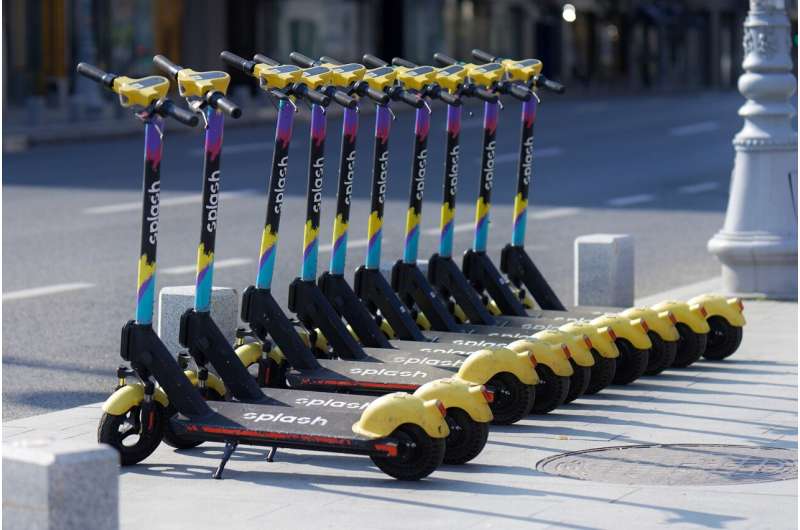This article has been reviewed according to Science X's editorial process and policies. Editors have highlighted the following attributes while ensuring the content's credibility:
fact-checked
peer-reviewed publication
trusted source
proofread
One in four e-scooter users admit riding under the influence

E-scooter users may be taking extra risks such as riding while under the influence of drugs or alcohol, new research has found.
Researchers from the University of Birmingham conducted a global review of existing research into risk factors, behaviors and attitudes towards electrically powered scooters. The team also conducted two surveys of public attitudes towards e-scooter use in the West Midlands.
The team's research, published in Frontiers in Public Health, reviewed 13 relevant studies using strict selection criteria from more than 400 that mention e-scooters, looking at themes including safety concerns, risk-taking behaviors, non-rider perceptions, and infrastructure.
While no study covered all of the themes, risk-taking behaviors featured in 10 studies included mobile phone use while using an e-scooter, as well as operating an e-scooter while under the influence of alcohol and/or drugs.
The researchers also surveyed the opinions of members of the public and specific road users about the safe use of e-scooters in the West Midlands. More than half of each group surveyed had used an e-scooter before, and key findings from the 153 participants include:
- 9% admitted to operating an e-scooter while under influence of drink and drugs,
- 7% observed e-scooter riders illegally riding on pedestrian footpaths, whereas only half of reported users (50.6%) admitted to using pavements,
- More than half (51.9%) had ridden an e-scooter with, or as a passenger, or both,
- Comments praising rental scooters which include lights, indicators and speed limiters included.
In a further survey of 146 road users, of whom 114 primarily used a car for transport, the majority of respondents (87) said they felt e-scooters were unsafe. Many also commented on a need to improve infrastructure, including repairs to uneven road surfaces. This aligns with other research found during the literature review, which showed poor road surfaces were the most common cause of accidents.
The surveys only had a small sample size and primarily recruited young people between 18-40, and the authors note in the study that future research would benefit from disaggregating data on the use of e-scooter public hire schemes and private ownership.
Nathalie Burt from the Institute of Inflammation and Ageing at the University of Birmingham and first author of the paper said, "Recent evidence from hospitals suggests that accidents involving e-scooter riders are resulting in increased trauma presentation, and our research set out to better understand the existing evidence and public attitudes towards e-scooter safety."
"Our surveys of some members of the public in the West Midlands suggest that while many young people are using e-scooters either through private ownership or public hire, many people are concerned about safety factors. These factors include personal behavior, such as riding under the influence of drugs and alcohol, as well as wider challenges, such as infrastructure."
"We note that there may be significant differences in attitudes towards safety between e-scooter users who access public hire compared to private owners. Furthermore, our surveys have sampled a small and relatively narrow group of people with views on e-scooter use. We recognize that there may be a wider range of opinions about e-scooter safety, but the fact that more than half of respondents have used one gives us a good understanding of how those likely to use them perceive safety."
Professor Zubair Ahmed, Director of the Centre for Trauma Sciences Research at the University of Birmingham and senior author of the paper, said, "This study helps us to better understand the opinions of those likely to use e-scooters and how they perceive safety and it is concerning that one in four had ridden a vehicle after drinking and/or using drugs. Many of the respondents to our survey pointed to a lack of legislation, and we might expect that public attitudes towards e-scooter use under the influence may shift as they become more widely used."
The survey respondents were mostly made up of young people aged 18-25 (79% in public opinion survey), with only a small number (8.5%) of respondents over the age of 40.
More information: Nathalie Burt et al, E-scooter attitudes and risk-taking behaviours: an international systematic literature review and survey responses in the West Midlands, United Kingdom, Frontiers in Public Health (2023). DOI: 10.3389/fpubh.2023.1277378

















